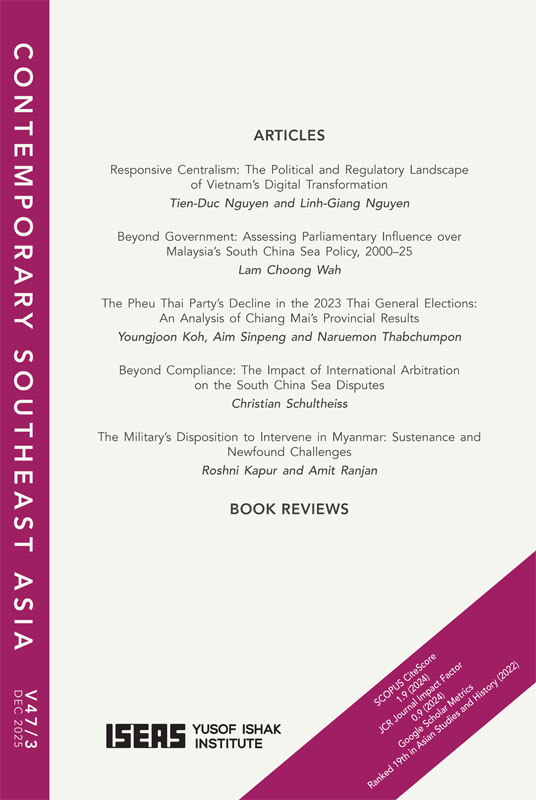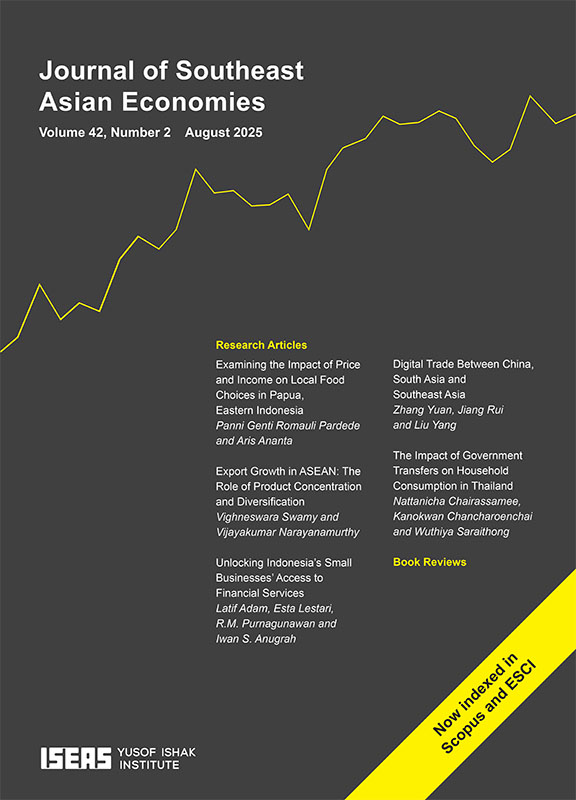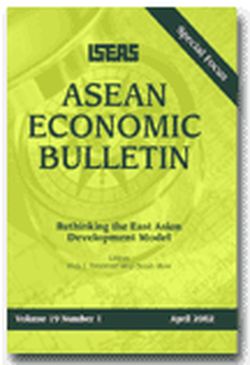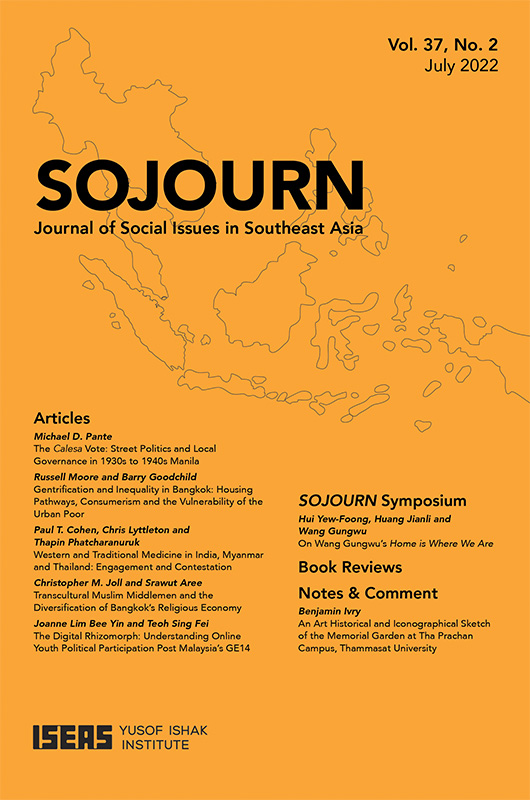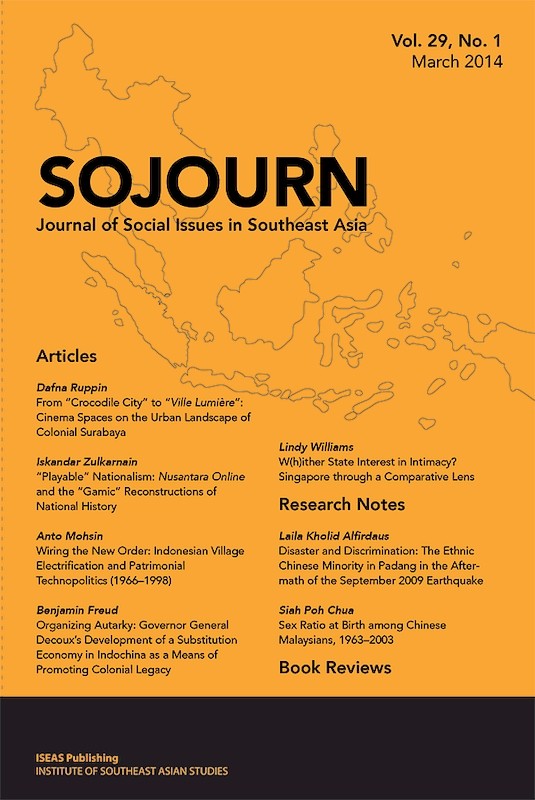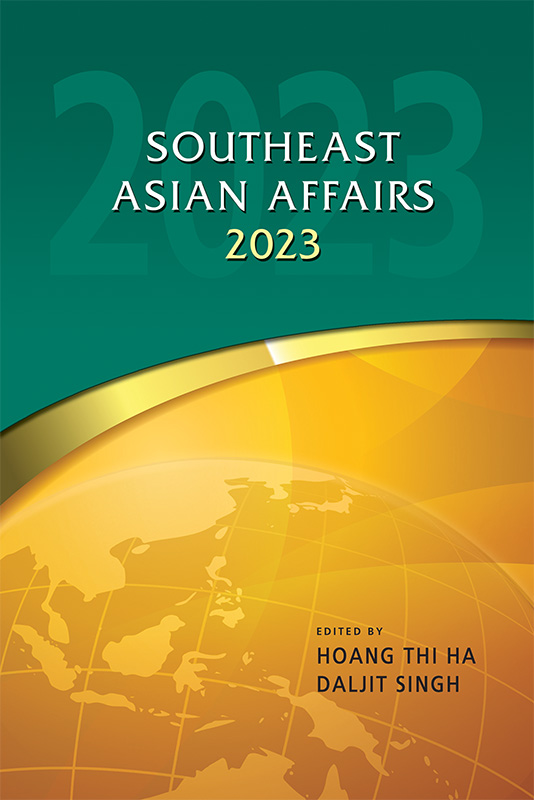Journal of Southeast Asian Economies Vol. 40/1 (April 2023). Special issue on "Digital Transformation in Southeast Asia"
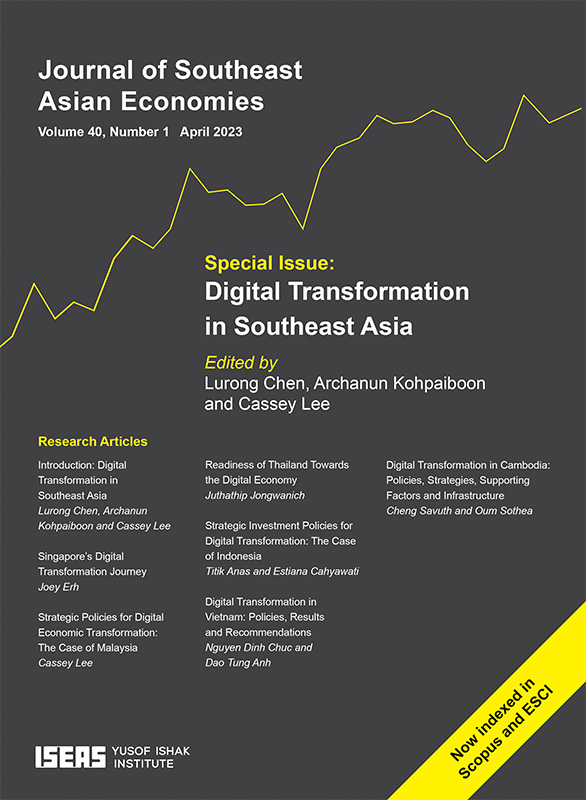
Date of publication:
April 2023
Publisher:
ISEAS – Yusof Ishak Institute
Number of pages:
173
Code:
AE40/1
Soft Cover
ISSN: 23395095
Contents
-
Journal of Southeast Asian Economies Vol. 40/1 (April 2023). Special issue on "Digital Transformation in Southeast Asia"
[Whole Publication, ISSN: 23395206] -
Preliminary pages
- RESEARCH ARTICLES
-
1. Introduction: Digital Transformation in Southeast Asia, by Lurong Chen, Archanun Kohpaiboon, Cassey Lee, authors
-
2. Singapore’s Digital Transformation Journey, by Joey Erh, author see abstractSingapore’s digital transformation journey has been primarily driven by the national government’s strong public policies and their successful implementation. In the beginning, the policies’ focus was on digitalizing the public sector and relying on the potential cascading effect on the private sector. Subsequently, policies were more heavy-handed on the private sector with strong incentives provided to encourage Information Technology (IT) adoption and the development of the IT-related sectors through investment in manpower and infrastructure. As the Internet became increasingly pervasive, the policies shifted towards growing e-commerce and eventually became indistinguishable from economic growth policies. At the same time, manpower skills, and physical and legal infrastructure were consistently improved to ensure that they kept up with digital advancements. There are several potential factors contributing to Singapore’s success, including: (i) strong collaborative ability across government agencies; (ii) extensive development and deepening of partnerships with multinational companies (MNCs); (iii) evidence-informed policy decisions; (iv) high adaptability and reactivity of the Singapore government; and (v) using Singapore’s small size as a strength. However, there are several challenges the country could face in the future. These include the limited pool of skilled manpower and slow IT adoption by small and medium-sized enterprises (SMEs).
-
3. Strategic Policies for Digital Economic Transformation: The Case of Malaysia, by Cassey Lee, author see abstractMalaysia’s first attempt at digital economic transformation began in the mid-1990s and lasted for some fifteen years. The Multimedia Super Corridor had some initial success but underachieved in some areas. The second phase of strategic policies took place in the period 2016–21 with the launch of four successive policies and plans dealing with e-commerce, 4IR manufacturing and the digital economy. The legal and regulatory landscape for the digital economy has also evolved. However, significant challenges lie ahead given the prevailing digital divide and unevenness in ICT adoption across industries.
-
4. Readiness of Thailand Towards the Digital Economy, by Juthathip Jongwanich, author see abstractThis paper aims to review digital transformation in Thailand. It describes and assesses key policies which have been introduced and modified to enhance the country’s digital economy. Digital services and other service sectors involving digital technology such as health and logistics show promising trends. Evidence from surveys reveals some concerns in terms of relatively low investment in the country’s digital economy, modest penetration of digital technology in manufacturing and agriculture sectors, and the small proportion of advanced IT-skilled workers. A review of investment promotion certificates showed that investment is more intense in the Eastern Economic Corridor. Other concerns include unequal access to and relatively high prices of digital-related technologies.
-
5. Strategic Investment Policies for Digital Transformation: The Case of Indonesia, by Titik Anas, Estiana Cahyawati, authors see abstractConsumption and production of digital goods and services have increased in Indonesia for the past ten years. A fast-growing e-commerce sector and an increase in digital payments supported the strong growth of the digital economy. Although Internet and digital transactions emerged in the late 1980s, the regulatory framework governing digital activities was only introduced in 2008 with the enactment of the Law on Electronic Information and Transactions. The government of Indonesia has relaxed foreign capital restrictions and provided fiscal incentives for digital businesses. Indonesia has also made commitments related to digital business in recent trade agreements in terms of the mutual recognition of consumer protection and cross-border data transfer. To encourage the use of ICT in public service, Indonesia introduced the 100 Smart City programme and has begun the implementation of electronic-based public service and operation (e-government). The government accelerated digital transformation during the COVID-19 pandemic by increasing the budget allocations for ICT in 2020 and 2021. To further accelerate digital transformation, the government needs to focus on digital literacy, nationwide integrated infrastructure, regulatory and institutional mechanisms and the innovation ecosystem.
-
6. Digital Transformation in Vietnam: Policies, Results and Recommendations, by Nguyen Dinh Chuc, Dao Tung Anh, authors see abstractThis paper attempts to elucidate Vietnam’s strategies and policies for fostering digital transformation. Vietnam has made some progress in the digital transformation of its economy but there are challenges to achieving further progress. Business enterprises struggle to adopt digital technologies due to technical, financial and regulatory constraints. These constraints include conversion costs, internal infrastructure resources, data leakages and ineffective regulations. The government has provided support for the digital transformation of enterprises through improvements in its å framework for the digital economy, promotion of science and technology, taxation regime and SME assistance. The government should undertake further legal reforms to support digital transformation, strengthen digital human resources and enhance e-government capabilities.
-
7. Digital Transformation in Cambodia: Policies, Strategies, Supporting Factors and Infrastructure, by Cheng Savuth, Sothea Oum, authors see abstractThis study analyses digital transformation strategies in Cambodia. Cambodia has made some progress in its readiness for digital transformation in terms of connectivity, infrastructure, human capital and skills, citizen participation, development of a digitalized private sector, digital government, and supporting regulations. However, the country still faces challenges in making further progress in digital transformation. Even though Cambodia has launched the Digital Economy and Society Policy Framework (DESPF 2021–35), several areas require further attention. These areas relate to the completeness of existing strategies, the feasibility of implementation, the order of prioritization of goals and policies, monitoring and assessment tools, seamless integration among implementers, and the minimization of negative impact. The government should also enhance the country’s strategies to promote FDI for digital transformation.
-
Acknowledgement List

